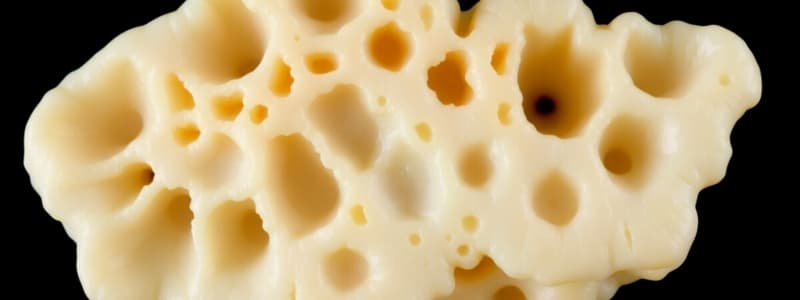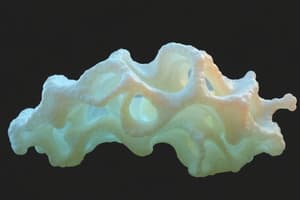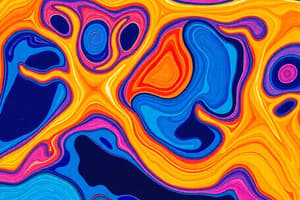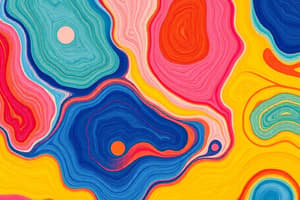Podcast
Questions and Answers
What is a primary characteristic that differentiates elastic cartilage from other types of cartilage?
What is a primary characteristic that differentiates elastic cartilage from other types of cartilage?
- Higher resilience and pliability (correct)
- Composition primarily of dense regular connective tissue
- Less cellular density
- Presence of a surrounding perichondrium
What type of connective tissue is fibrocartilage primarily composed of?
What type of connective tissue is fibrocartilage primarily composed of?
- Hyaline cartilage and adipose tissue
- Elastic cartilage and loose connective tissue
- Dense regular connective tissue and hyaline cartilage (correct)
- Reticular connective tissue and bone matrix
Which structure is NOT associated with the support and protection function of bone tissue?
Which structure is NOT associated with the support and protection function of bone tissue?
- Canaliculi
- Lacunae
- Osteocytes
- Perichondrium (correct)
What is the function of canaliculi in bone tissue?
What is the function of canaliculi in bone tissue?
What type of cartilage appears to withstand compression and shearing forces effectively?
What type of cartilage appears to withstand compression and shearing forces effectively?
How does the extracellular matrix of fibrocartilage differ from that of hyaline cartilage?
How does the extracellular matrix of fibrocartilage differ from that of hyaline cartilage?
Which location is commonly associated with the presence of hyaline cartilage?
Which location is commonly associated with the presence of hyaline cartilage?
In mature bone tissue, which structural unit is primarily responsible for its organized architecture?
In mature bone tissue, which structural unit is primarily responsible for its organized architecture?
Which of the following characteristics describes the chondrocytes in fibrocartilage?
Which of the following characteristics describes the chondrocytes in fibrocartilage?
Which of the following best describes the mineralization of the bone matrix?
Which of the following best describes the mineralization of the bone matrix?
What is the primary composition of hyaline cartilage that gives it its glassy appearance?
What is the primary composition of hyaline cartilage that gives it its glassy appearance?
Which major component is NOT found in the extracellular matrix of hyaline cartilage?
Which major component is NOT found in the extracellular matrix of hyaline cartilage?
What distinguishes elastic cartilage from hyaline cartilage?
What distinguishes elastic cartilage from hyaline cartilage?
In terms of cartilage structure, what role does the perichondrium play?
In terms of cartilage structure, what role does the perichondrium play?
Which glycosaminoglycan (GAG) is NOT part of the ground substance in hyaline cartilage?
Which glycosaminoglycan (GAG) is NOT part of the ground substance in hyaline cartilage?
What is a primary functional significance of the extracellular matrix in cartilage?
What is a primary functional significance of the extracellular matrix in cartilage?
Which statement accurately characterizes fibrocartilage?
Which statement accurately characterizes fibrocartilage?
Which feature of hyaline cartilage plays a critical role in its development and maintenance?
Which feature of hyaline cartilage plays a critical role in its development and maintenance?
Where is hyaline cartilage typically found in a fully grown individual?
Where is hyaline cartilage typically found in a fully grown individual?
What are the branching and anastomosing structures within the matrix of elastic cartilage primarily composed of?
What are the branching and anastomosing structures within the matrix of elastic cartilage primarily composed of?
Which type of collagen fibers predominantly characterize the matrix of hyaline cartilage?
Which type of collagen fibers predominantly characterize the matrix of hyaline cartilage?
What structure surrounds hyaline cartilage but is absent on the free surfaces of articular cartilage?
What structure surrounds hyaline cartilage but is absent on the free surfaces of articular cartilage?
Which glycosaminoglycan is NOT part of the ground substance found in hyaline cartilage?
Which glycosaminoglycan is NOT part of the ground substance found in hyaline cartilage?
What is the primary role of the extracellular matrix in cartilage?
What is the primary role of the extracellular matrix in cartilage?
In comparison to hyaline cartilage, what is a distinctive feature of elastic cartilage?
In comparison to hyaline cartilage, what is a distinctive feature of elastic cartilage?
Which characteristic is true regarding the lacunae in hyaline cartilage?
Which characteristic is true regarding the lacunae in hyaline cartilage?
Which of the following statements accurately describes the composition of fibrocartilage?
Which of the following statements accurately describes the composition of fibrocartilage?
In fully grown individuals, where would remnants of cartilage typically be found?
In fully grown individuals, where would remnants of cartilage typically be found?
Which statement differentiates elastic cartilage from hyaline cartilage?
Which statement differentiates elastic cartilage from hyaline cartilage?
What primarily inhibits the vascular supply to cartilage?
What primarily inhibits the vascular supply to cartilage?
Which structural feature distinguishes fibrocartilage from elastic cartilage?
Which structural feature distinguishes fibrocartilage from elastic cartilage?
What role do canaliculi play in the bone tissue structure?
What role do canaliculi play in the bone tissue structure?
Which characteristic is NOT associated with bone tissue?
Which characteristic is NOT associated with bone tissue?
In which location would you least expect to find elastic cartilage?
In which location would you least expect to find elastic cartilage?
Which feature is unique to lamellar (mature) bone compared to other types of bone?
Which feature is unique to lamellar (mature) bone compared to other types of bone?
What is the primary function of fibrocartilage in joints?
What is the primary function of fibrocartilage in joints?
What key component is absent in fibrocartilage that is present in both hyaline and elastic cartilage?
What key component is absent in fibrocartilage that is present in both hyaline and elastic cartilage?
Which of the following best describes the arrangement of cells in fibrocartilage?
Which of the following best describes the arrangement of cells in fibrocartilage?
Which structure is formed by the concentric arrangement of lamellae in bone tissue?
Which structure is formed by the concentric arrangement of lamellae in bone tissue?
Which property of bone tissue is primarily due to the mineralization of its extracellular matrix?
Which property of bone tissue is primarily due to the mineralization of its extracellular matrix?
Flashcards
Cartilage Composition
Cartilage Composition
Cartilage is connective tissue made of chondrocytes and extracellular matrix.
Cartilage Matrix
Cartilage Matrix
Mostly extracellular material, more than 95% of cartilage's volume.
Avascular Cartilage
Avascular Cartilage
Cartilage lacks blood vessels.
Hyaline Cartilage
Hyaline Cartilage
Signup and view all the flashcards
Hyaline Cartilage Matrix
Hyaline Cartilage Matrix
Signup and view all the flashcards
Elastic Fibers in Cartilage
Elastic Fibers in Cartilage
Signup and view all the flashcards
Elastic Cartilage
Elastic Cartilage
Signup and view all the flashcards
Fibrocartilage
Fibrocartilage
Signup and view all the flashcards
Fibrocartilage Location
Fibrocartilage Location
Signup and view all the flashcards
Bone Structure
Bone Structure
Signup and view all the flashcards
Bone Matrix
Bone Matrix
Signup and view all the flashcards
Bone Cells
Bone Cells
Signup and view all the flashcards
Osteons
Osteons
Signup and view all the flashcards
Osteonal Canal
Osteonal Canal
Signup and view all the flashcards
Volkmann's Canals
Volkmann's Canals
Signup and view all the flashcards
Cartilage Lacunae
Cartilage Lacunae
Signup and view all the flashcards
Isogenous Groups
Isogenous Groups
Signup and view all the flashcards
Collagen Type II
Collagen Type II
Signup and view all the flashcards
Cartilage Perichondrium
Cartilage Perichondrium
Signup and view all the flashcards
Chondrocytes
Chondrocytes
Signup and view all the flashcards
Canaliculi
Canaliculi
Signup and view all the flashcards
GAGs in Cartilage
GAGs in Cartilage
Signup and view all the flashcards
Study Notes
Cartilage
- Cartilage is a connective tissue composed of chondrocytes and an extracellular matrix.
- The extracellular matrix makes up more than 95% of cartilage's volume.
- Cartilage is avascular, meaning it lacks blood vessels.
- The extracellular matrix is essential for the diffusion of substances between chondrocytes and blood vessels in surrounding connective tissue.
Types of Cartilage
- Hyaline Cartilage
- Contains type II collagen fibers, GAGs, proteoglycans, and multiadhesive glycoproteins.
- Found in articular surfaces of joints (articular cartilage), rib cage (costal cartilages), trachea, bronchi, larynx, and nose.
- The perichondrium surrounds hyaline cartilage, except on articular surfaces.
- Spaces called lacunae contain chondrocytes.
- The extracellular matrix of hyaline cartilage appears glassy and is produced by chondrocytes.
- Chondrocytes are distributed singularly or in clusters called isogenous groups.
- Elastic Cartilage
- Contains elastic fibers and elastic lamellae in addition to the matrix material of hyaline cartilage.
- Found in the external ear, middle ear, and larynx.
- The elastic material gives elastic cartilage properties in addition to resilience and pliability, characteristic of hyaline cartilage.
- Always surrounded by the perichondrium.
- Fibrocartilage
- A combination of dense regular connective tissue and hyaline cartilage.
- Contains abundant type I collagen fibers and the matrix material of hyaline cartilage.
- The chondrocytes are dispersed among the collagen fibers singularly, in rows, and isogenous groups.
- The chondrocytes appear similar to hyaline cartilage chondrocytes but have considerably less cartilage matrix material.
- No surrounding perichondrium.
- Found in intervertebral discs, the pubic symphysis, articular discs, menisci of the knee joint, etc.
- Serves as a shock absorber.
- Resist both compression and shearing forces.
Bone
- Bone is a specialized form of connective tissue comprised of cells and an extracellular matrix.
- The matrix is mineralized, making the tissue hard and providing support and protection.
- Contains spaces called lacunae, which house bone cells, or osteocytes.
- Osteocytes extend processes into small tunnels called canaliculi.
- Canaliculi connect adjacent lacunae, allowing contact between neighboring osteocytes.
- Mature (lamellar) bone is mostly composed of osteons (Haversian systems), which are concentric lamellar structures organized around an osteonal (Haversian) canal.
- The osteonal canal houses the vascular and nerve supply of the osteon.
- Perforating (Volkmann's) canals are perpendicular to osteonal canals and connect them to each other.
- Lacunae between concentric lamellae contain osteocytes, interconnected via canaliculi.
Cartilage
- Cartilage is a type of connective tissue composed of chondrocytes (cells) and a specialized extracellular matrix.
- Cartilage is avascular, meaning it doesn't have blood vessels.
- Extracellular matrix makes up over 95% of cartilage volume and is essential for substance diffusion between chondrocytes and blood vessels.
Types of Cartilage
-
Hyaline Cartilage: Contains type II collagen fibers, GAGs (glycosaminoglycans), proteoglycans, and multiadhesive glycoproteins.
- Contains lacunae, which house chondrocytes.
- Matrix appears glassy and homogenous due to chondrocyte production.
- Chondrocytes are found individually or in clusters called isogenous groups.
- Contains three types of GAGs: hyaluronan, chondroitin sulfate, and keratan sulfate.
- Surrounded by perichondrium, a connective tissue, except on articular surfaces.
- Found in articular surfaces of joints (articular cartilage), rib cage (costal cartilages), trachea, bronchi, larynx, and nose.
-
Elastic Cartilage: Contains the same components as hyaline cartilage, but also contains elastic fibers and lamellae, giving it more elasticity.
- Always surrounded by perichondrium.
- Found in the external ear, middle ear, and larynx.
-
Fibrocartilage: Combines features of dense regular connective tissue and hyaline cartilage.
- Chondrocytes are dispersed among collagen fibers individually, in rows, or isogenous groups.
- Chondrocytes have less cartilage matrix material than hyaline cartilage chondrocytes.
- No surrounding perichondrium.
- Found in intervertebral discs, pubic symphysis, articular discs, menisci of the knee joint, and other areas.
- Acts as a shock absorber due to its resistance to compression and shearing forces.
Bone
- Bone is a specialized connective tissue with cells and extracellular matrix.
- Distinguished by its mineralized matrix, which gives it hardness, support, and protection.
Bone Structure
- Bone matrix contains lacunae, which house osteocytes (bone cells).
- Osteocytes have processes that extend into canaliculi, small tunnels through the mineralized matrix.
- Canaliculi connect adjacent lacunae, allowing communication between osteocytes.
- Mature bone (lamellar bone) is mostly composed of osteons (Haversian systems).
- Concentric lamellae (layers) organized around an osteonal canal, which contains blood vessels and nerves.
- Perforating (Volkmann's) canals connect osteonal canals perpendicularly.
- Lacunae between lamellae contain osteocytes connected by canaliculi.
Studying That Suits You
Use AI to generate personalized quizzes and flashcards to suit your learning preferences.




